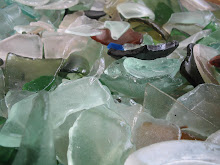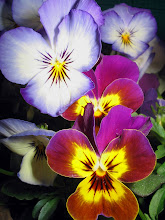 Good to see Sam Jordison in the Guardian extolling the virtues of J L Carr's utterly wonderful short novel A Month in the Country - an elegaic, moving tale of two damaged survivors of the First World War, uncovering a medieval wall painting in a church in rural Yorkshire, during the long hot summer of 1920. It won the Guardian Fiction Prize in 1980 and was shortlisted the same year for the Booker Prize.
Good to see Sam Jordison in the Guardian extolling the virtues of J L Carr's utterly wonderful short novel A Month in the Country - an elegaic, moving tale of two damaged survivors of the First World War, uncovering a medieval wall painting in a church in rural Yorkshire, during the long hot summer of 1920. It won the Guardian Fiction Prize in 1980 and was shortlisted the same year for the Booker Prize.This has long be a dearest favourite of mine. As indeed are all Carr's beautifully crafted and lovingly self-published novels. If you've never discovered them, then you must! Carr's voice and style are unique - and once you are hooked you will fall in love for ever.
Carr (1912-94) retired from teaching to write full time and originally established The Quince Tree Press as the publishing house for a series of ‘Pocket Books’: small selections from the great poets, idiosyncratic dictionaries, small histories and volumes of 'Fabled Saying' and illustrations by his favourite wood engravers.
 The income from these popular little books allowed him to concentrate on his novels, which were all originally published by conventional publishers, but he bought back the rights and re-published them himself, in attractively designed Quince Tree editions. The Quince Tree Press continues as an independent family-run publishing house, now based in Suffolk.
The income from these popular little books allowed him to concentrate on his novels, which were all originally published by conventional publishers, but he bought back the rights and re-published them himself, in attractively designed Quince Tree editions. The Quince Tree Press continues as an independent family-run publishing house, now based in Suffolk.
Along with A Month in the Country, my other favourite J L Carr is the very different, riotously bookish Harpole and Foxberrow General Publishers - a brilliant, quirky novel about a small, chaotic private publishing house. This is real book-lover's book, it's wonderfully 'inky' and explores the whole concept of what books are, where they come from, how they're made and what they're for - and manages to be both comic and profound. If you have Richard Kennedy's A Boy at the Hogarth Press, Anne Fadiman's Ex Libris or Diana Athill's Stet on your shelves and loved them, then I advise you to rush out and buy a copy of Harpole and Foxberrow right this very instant! - it's an addition to the TBR pile you won't regret.

Back to A Month in the Country, and I really can't better Sam Jordison's assessment of the novel, so I'll quote it at length here. His article starts with a review of the 1987 film, starring two remarkably fresh-faced actors named Kenneth Branagh and Colin Firth. The film is gorgeous, but nevertheless Jordison is absolutely right:
'Somehow the magic that makes JL Carr's book so precious is missing. It's probably unfair to criticise the film for not being able to recreate this spellbinding quality. Not least because I'm unable to define it myself. Whatever it is that separates the book from its big screen incarnation is a question of feeling and atmosphere as much as anything solid. It's easy enough to catalogue A Month In the Country's merits (and I will shortly) but there's an extra elusive something that I can only suggest you read the book to understand.
To encourage this pleasurable undertaking (and brief, I might add, since it clocks in at less than 100-pages), here's a list of a few of those virtues. The story of the narrator's secret love for another man's wife and ongoing struggle to recover from the trauma of being a signaller in the first world war is moving. The rural setting is beguiling with its evocation of a lost world "at the end of the horse age" full of alarmingly plain speaking, but unfailingly generous Yorkshire folk. The writing is lovely too. It's as simple and rich as the countryside it describes ("ditches and roadside deep in grass, poppies, cuckoo pint, trees heavy with leaf, orchards bulging over hedge briars"), but shot through with a mordant wit that ensures the book has an edge to sharpen all that easy bucolic softness. Finally, there's also the added physical appeal of the slim volume itself - at least if you are lucky enough to have the splendid Quince Tree Press edition designed by the author himself.
But even accounting for all these various delights, A Month In The Country is far more than the sum of its parts. It's full of emotive, nostalgic intangibles that the Germans probably have an admirable long word for, I can't define and it would take a hell of a film to recreate. The one showing this weekend falls short, but the ICA has done enough just by programming it: they've sent me back to the book.'  Like Sam, I'm just off to dig out the book and re-read it for the umpteenth time . . .
Like Sam, I'm just off to dig out the book and re-read it for the umpteenth time . . .





















5 comments:
How lovely to see this book on your blog today! I have a signed copy. I also have some of those delightful little books Carr produced, many of them featuring wood engravings.
Apparently the Pocket Books originally bore two prices - one for adults and a lower one for children! Isn't that sweet? I believe the Quince Tree Press JLC novel (while he was alive) that *isn't* signed is the rarity. I think this personal touch was entirely characteristic of his attitude to books and just about everything else, and it comes across strongly in Harpole & Foxberrow. I was given a Folio Society edition of AMITC, which is lovely (it goes without saying), but I confess that I prefer reading from the (signed!) Quince Tree edition - they are so beautifully produced.
I have wanted to read this for some time and hope to get my paws on a Quince Tree Press edition someday. We have one of Carr's county maps which are lovely quirky interpretations of what is best about each English county. These are also still available from Quince Tree.
Juliet, this is a long-standing favorite of mine, and is on my bedside table right now, as a matter of fact. I have gone ahead and ordered Harpole & Foxberrow, on your say so. Had never heard of it. Could not find it on this side of the pond.
Thank you again, I expect.
I have a humble Penguin edition of A month in the Country, and will be reading it soon after Sam and your recommendations. I also loved Ex Libris, so will have to track down a copy of Harpole, hopefully in a Quince Tree Press edition as they do look lovely.
Post a Comment